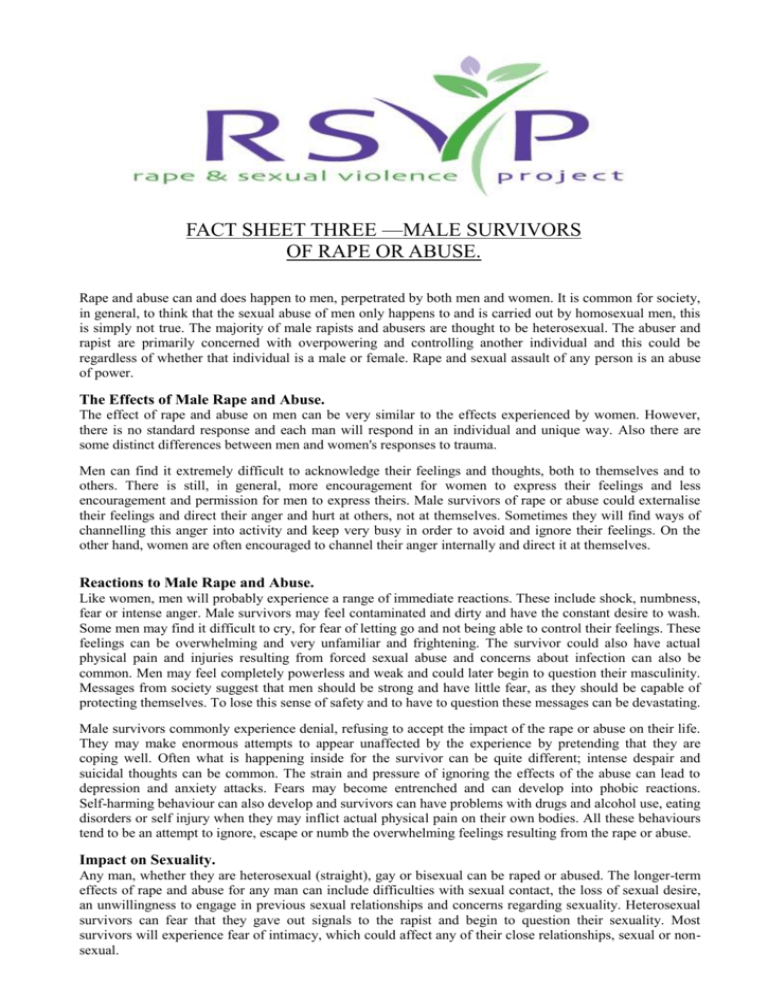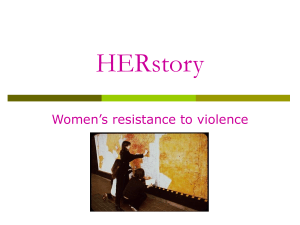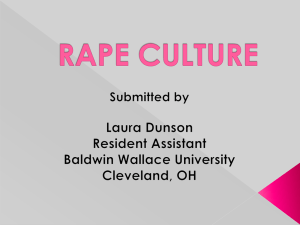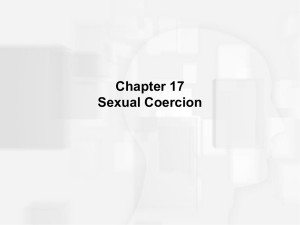
FACT SHEET THREE —MALE SURVIVORS
OF RAPE OR ABUSE.
Rape and abuse can and does happen to men, perpetrated by both men and women. It is common for society,
in general, to think that the sexual abuse of men only happens to and is carried out by homosexual men, this
is simply not true. The majority of male rapists and abusers are thought to be heterosexual. The abuser and
rapist are primarily concerned with overpowering and controlling another individual and this could be
regardless of whether that individual is a male or female. Rape and sexual assault of any person is an abuse
of power.
The Effects of Male Rape and Abuse.
The effect of rape and abuse on men can be very similar to the effects experienced by women. However,
there is no standard response and each man will respond in an individual and unique way. Also there are
some distinct differences between men and women's responses to trauma.
Men can find it extremely difficult to acknowledge their feelings and thoughts, both to themselves and to
others. There is still, in general, more encouragement for women to express their feelings and less
encouragement and permission for men to express theirs. Male survivors of rape or abuse could externalise
their feelings and direct their anger and hurt at others, not at themselves. Sometimes they will find ways of
channelling this anger into activity and keep very busy in order to avoid and ignore their feelings. On the
other hand, women are often encouraged to channel their anger internally and direct it at themselves.
Reactions to Male Rape and Abuse.
Like women, men will probably experience a range of immediate reactions. These include shock, numbness,
fear or intense anger. Male survivors may feel contaminated and dirty and have the constant desire to wash.
Some men may find it difficult to cry, for fear of letting go and not being able to control their feelings. These
feelings can be overwhelming and very unfamiliar and frightening. The survivor could also have actual
physical pain and injuries resulting from forced sexual abuse and concerns about infection can also be
common. Men may feel completely powerless and weak and could later begin to question their masculinity.
Messages from society suggest that men should be strong and have little fear, as they should be capable of
protecting themselves. To lose this sense of safety and to have to question these messages can be devastating.
Male survivors commonly experience denial, refusing to accept the impact of the rape or abuse on their life.
They may make enormous attempts to appear unaffected by the experience by pretending that they are
coping well. Often what is happening inside for the survivor can be quite different; intense despair and
suicidal thoughts can be common. The strain and pressure of ignoring the effects of the abuse can lead to
depression and anxiety attacks. Fears may become entrenched and can develop into phobic reactions.
Self-harming behaviour can also develop and survivors can have problems with drugs and alcohol use, eating
disorders or self injury when they may inflict actual physical pain on their own bodies. All these behaviours
tend to be an attempt to ignore, escape or numb the overwhelming feelings resulting from the rape or abuse.
Impact on Sexuality.
Any man, whether they are heterosexual (straight), gay or bisexual can be raped or abused. The longer-term
effects of rape and abuse for any man can include difficulties with sexual contact, the loss of sexual desire,
an unwillingness to engage in previous sexual relationships and concerns regarding sexuality. Heterosexual
survivors can fear that they gave out signals to the rapist and begin to question their sexuality. Most
survivors will experience fear of intimacy, which could affect any of their close relationships, sexual or nonsexual.
Some male survivors experience sexual arousal or ejaculation during rape or abuse. When this happens it can
be devastating for the survivor. They may start to wonder whether part of them enjoyed the rape or abuse and
feelings of intense confusion can result. Guilt can also be common and it is important for the survivor to
recognise that both arousal and ejaculation are physiological, body reactions and do not necessarily show
sexual desire or enjoyment.
Reporting to the Police.
Male rape is now recognised, in law, as a criminal offence and a number of prosecutions have resulted. The
police can and do investigate complaints of male rape and abuse and many forces are now training officers to
support male and female survivors. The same procedure applies for any reported rape or abuse whether the
survivor is a man or a woman. The report will be investigated, statements will be taken and evidence will be
collected. A Police Surgeon usually examines the survivor and takes body samples. If an assailant is caught,
the case will eventually be passed to the Crown Prosecution Service. They will decide whether a prosecution
through the courts will take place. If the Crown Prosecution Service decides that the case can go ahead the
survivor will probably be required to give his evidence and answer questions at the Crown Court. The
Police should keep the survivor updated about the result and progress of the case.
How to Support Someone who is a Male Survivor:
It is important that the survivor can talk to a person he trusts and be given support and help to cope with the
effects of the rape and the abuse. The survivor may need to hear that whatever he did to survive the rape or
abuse is okay. For instance, a survivor may feel guilty because due to fear he did everything that the rapist or
abuser asked him to. However, the survivor needs to know that it was this behaviour which helped him
survive the abuse and that in no way was he to blame for what happened. Hopefully with the right support
the survivor will believe that he was not responsible for the rape or abuse.
If You Are a Survivor of Rape or Childhood Sexual Abuse:
Listen and accept your feelings and thoughts and when you are ready, tell someone about the rape
or abuse, someone that will listen to you and support you.
You may want to report the rape or abuse to the police but this is an important decision that only
you can make.
Give yourself time, the effects of rape and abuse can be long term and you will need to recover and
heal slowly and in your own way. It can take months and even years to overcome the effects of rape
and abuse.
You may not want to talk about what has happened, this is your choice. However, try not to pretend
that the rape or abuse did not happen, be honest with yourself. If you deny that the rape and abuse
happened your feelings won’t disappear, they will only become buried, affecting you in a variety of
ways.
Recognise that it is usual to have a range of different feelings, which could change from day to day.
Talking to someone, in confidence, could help you make sense of things. A helpline volunteer will
listen and explore your feelings with you. You might feel nervous calling the helpline to ask for
support; it takes courage to call.
A volunteer will appreciate this and treat you with respect and sensitivity. All helpline volunteers are
specially trained to speak to anyone affected by rape, sexual assault or childhood sexual abuse; they
can offer support, information and a listening ear. The helpline has an answer-phone that tells you
when we are open. If you call when the helpline is closed you can leave a name and a safe contact
number and a volunteer will call you back.
RSVP office: 0121 643 0301 Helpline: 0121 643 4136
Leaflets, handouts, exercises and posters
This factsheet may be photocopied under the following conditions:
1. Each page must be copied in its entirety, including RSVP information headings, where applicable.
2. Copies may be made for use within organisations for training purposes or for clients/individuals for self help purposes.
3. Copies may not be resold.







